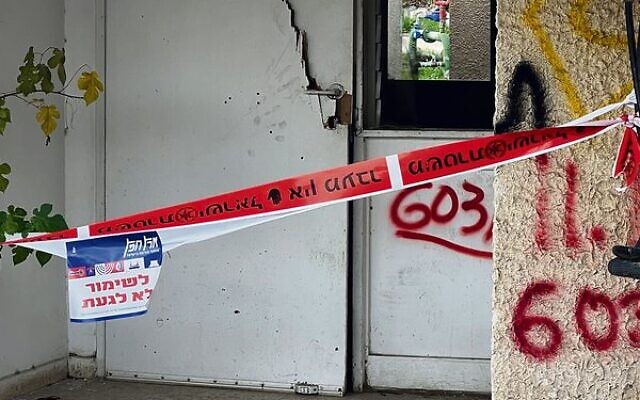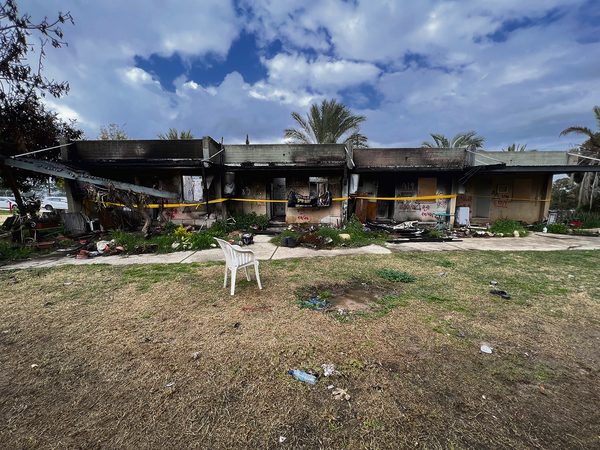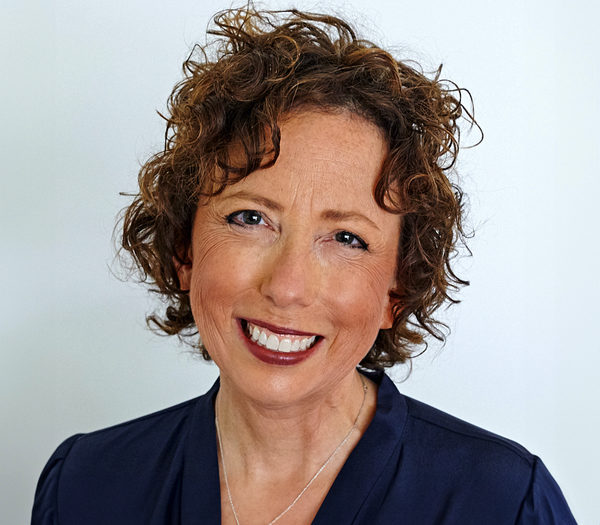The role for Australian Jews
Simone Szalmuk-Singer shares her reflections of visiting Israel and what we can do to help.

“I’m 74, I have to learn to how to live anew,” said Varda Goldstein, resident of Kibbutz Kfar Aza as she vows to return to a rebuilt kibbutz, when it is safe, and when she has a house.
Having recently returned from Israel, I wonder whether all Jews must now learn how to live anew in this post October 7 world.
I sat with Varda for several hours in her temporary “home” in a Tel Aviv hotel as she shared her story.
On October 7, Varda was holidaying in Bulgaria with other kibbutz members when their phones lit up with red alerts of missiles targeting Israel. Varda’s son Nadav and granddaughter Yam were murdered that morning. For 11 days, Varda’s daughter-in-law Chen and three grandchildren, Agam (17), Gal (11) and Tal (9) were missing, presumed killed, until Varda was eventually informed that they were kidnapped into Gaza.

As a previous president of JNF Victoria, I had met Varda every year when she worked for the Sha’ar HaNegev Regional Council. She was so proud of the success of the region and thrilled to have meaningful partnerships with Australian families. Varda wears many hats now, none of which she chose. She is a bereaved grandmother, bereaved mother, a mother-in-law and grandmother of former hostages, her home has been burnt to the ground and she is a refugee in her own country.
I spent 12 days in Israel in my current role as CEO and director of the Erdi Foundation, working with grantee organisations, visiting Israeli family, listening to survivors, talking to soldiers and walking through the kibbutzim and cities once so familiar but which became “ground zero” of mass slaughter and rape on the infamous “Shabbat shchorah” “Black Saturday” of October 7, 2023.
Finally exiting the unconstructive loop of “no words” that played in my head since October 7, I am ready to share key reflections on what I saw, focusing on the role of Australian Jewry.

1. The magnitude of October 7 and the scale of the ongoing consequences
Despite following every detail of October 7 through my work and connections to family, the magnitude and depth of evil cannot be appreciated until walking through the mass destruction of the affected communities. Whilst the stench of death has been removed, the smell of ash hangs in the air.
I stood in the remains of a “mamad” (safe room) in Kibbutz Nir Oz looking out the smashed window imagining the terror of the family trapped inside, choking, as their house had been set alight to force them out. Inside, the grandparents, child and grandchild had to make the chilling choice between dying by asphyxiation or climbing through the window to be executed. The trapped grandmother was a Holocaust survivor. Why did she need to endure this torture again? In Israel! They climbed out undetected and hid for three hours just one metre away from the terrorists who were preoccupied killing, beheading, raping and looting. At approximately 2pm, the terrorists left, their work complete. Amit, who shared this story, broke down in tears as he quietly disclosed that this was his family and they miraculously survived.

Kibbutz Nir Oz is a devastating contrast between death and destruction on the one hand, and blossoming gardens on the other. It represents every element of October 7; evil, abject failure to defend Israeli citizens, incredible bravery and heart-wrenching tragedy. One quarter of the kibbutz’s population was slaughtered or kidnapped. The gardens remain intact as the Israeli Defence Forces arrived only after the terrorists left; no tank battles flattened the landscape. Survivors who hid for hours spoke of hearing Arabic voices of men, women and children burning and looting their homes. A makeshift highway appeared between the village of Khirbet Ikhza’a in Gaza via a hole in the fence through to the kibbutz. People drove back and forth, taking hostages, bodies, parts of bodies, and anything else of perceived value. An IDF soldier involved in clearing this village in Gaza of terrorists, described to me what they found in “civilian” homes. Amongst the bullets, mortars, plans to kill and evidence of hostages, were the possessions of the kibbutz, including chanukiahs, challah covers – they grabbed everything.
The intentional depravity is unspeakable. In Kfar Aza, Gon, a kibbutz member and survivor explained what the various symbols drawn on each house mean such as “cleared” of “explosives”, “bodies”, “checked by the army”. One sticker reads “mezukeh”, each with a date indicating ZAKA completed its work.
ZAKA is the organisation that removes bodies and body parts for burial. Houses next to each other might have different “completion dates” weeks apart. The later date reflecting the extent of evil that took place inside and how long it took to locate and clear every single body fragment sprayed in all directions. For those burnt alive, specialist archaeological techniques are used to identify charred remains.
The scale of October 7 means endless stories of bravery and endless tragedies where each and every one would constitute a news story of its own for a week in a “normal time”. How do we honour each and protect them from being lost in the vast sea of stories? Varda recounts how her daughter-in-law Chen climbed over the bodies of her husband and eldest daughter as she was abducted into Gaza with her other children. Chen was a hostage for 50 days and saw what has been done to the remaining hostages – women shot in their legs, fingers cut off, regular sexual abuse. Consequently, hostages are possibly pregnant, their lives in danger, all while the terror assault against Israel continues. There is no time to stop, mourn and take stock of the tragedy that refuses to end.
It must not be forgotten that cities were also infiltrated by terrorists and struck by incessant missile fire. It was chilling walking through Ofakim, where now famous Rachel survived by feeding the terrorists in her home for hours and Ashkelon which in the first two months of the war, was targeted by over 1380 missiles, yet it was never evacuated, leaving its council and population to fend for themselves under constant fire.
And the tragedy of the Nova festival. Moving through the site of the massacre, one is struck by the scale of murder and rape that occurred at a place where people came to dance in nature. Pure young joy unjustly stolen from this world – their photos on sticks stand silently in the wind.
In addition to the victims, the hostages and their families, are the “mefunim” (evacuees). Approximately 150,000+ from the south and north of Israel, a number constantly changing as evacuees move to “permanent temporary” accommodation. The situation remains unresolved for many. The longer that families live in inappropriate hotel accommodation coupled with inadequate frameworks for schooling, childcare and volunteer management, the increased likelihood of ever-growing social issues, youth at risk and abuse. The consequences of initial chaos and prolonged inadequate responses is an unfolding problem, the true extent of which we will only discover in time.
Meanwhile the war continues with no clear end. Approximately 300,000+ reservists left their families and work for months. The psychological and economic effects on the soldiers, their families and the economy generally are enormous, all compounded when soldiers are killed or endure life changing injuries. It was heartbreaking hearing personal accounts. Significant mental health and financial support will be required from now and for decades. To provide perspective, soldiers and families are still dealing with PTSD from the Yom Kippur War.
Despite the appearance of life “returning to normal” in parts of the country, it is very much still October 7 in Israel and will remain so while the hostages are captive, the population is displaced and soldiers die.
2. The complexity of moving forward
needs coordination and collaboration
It is a gross understatement to say that there is much work to be done. Examples of complexities to keep in mind when trying to navigate the way forward include:
• Each displaced kibbutz community has its own character requiring unique solutions. The decision making process is complicated by the vague timelines regarding security and/or uncertainty about when rebuilding will start. This in turn affects communities absorbing evacuees as they must adapt schools, employment, services and businesses. Accordingly, there are resources and funding considerations for both the “evacuee” and “recipient” communities.
• The majority of work should ordinarily be funded and overseen by government. Most organisations which stepped in during the immediate aftermath of October 7 are still operating efforts in key areas, hoping to handover as soon as possible. Forward planning is complicated by increased division within the government and the uncertainty about allocation of government funding for the rebuild. As a consequence, the allocation of some accrued emergency philanthropic funding is being withheld.
• The fragile security in the north is exacerbating the situation as substantial additional emergency funding may be needed to accommodate a surge in evacuees in extremely challenging circumstances.
• Whilst the country is no longer acutely chaotic, organisational and departmental confusion and overlap remains. In addition, many new well-meaning initiatives are being created to address unmet needs. At best, there is risk of duplication, at worst, there are risks of unsafe practices particularly when providing mental health programs to a population desperate for solutions.
Australian donors can play a meaningful role in connecting organisations/initiatives and working together. There have been impactful funding collaborations that have arisen in Israel and around the world with scope for more.
I recommend:
• Continually revisit whether addressing immediate, medium and long term needs. As the war continues with many unknowns, this timeline is a blurred continuum. Pacing donations pending government funding allocations and changing needs is prudent in preventing donor fatigue and a shortage of funds at critical junctures in the future.
• Continue supporting existing grantees and organisations which were funded prior to October 7. Whilst their organisational priorities may have shifted, it is likely that their work is more important now than before.
• Collaborate with other donors and foundations to share information and to help identify gaps that are being overlooked. Many “lower profile” or “less affected” communities have serious needs with little capacity to highlight those needs to donors. Co-funding projects is a way of increasing donor impact.
• Remember local Jewish community needs. Thriving Jewish life around the world must be preserved. The Australian Jewish community must remain a resilient and strong community. It is vital that the community continues to empower vibrant Jewish life that existed before October 7 as well as support the increased needs that have arisen as a consequence of the war, specifically, advocacy, security and mental health.
• If there was ever a time to increase overall giving to Israel and the Jewish community, it is now and for the next few years. This includes all sizes and forms of giving of time, talent, treasure and ties.
3. The Israel-Diaspora relationship shining through the darkness
“Am Yisrael chai” are words we hear repeatedly as stories of tragedy and bravery are recounted. These words reflect our Jewish resilience to survive as we always have. On October 7 the Israeli spirit shone a light through the darkness and drove the nation to step up, serve, rescue, and do what was needed in the line of fire. The nation came together to save itself and continues to this day. Whether it was the young religious mother who drove a smashed up bloodied ambulance under fire to rescue the injured, the Ashkelon council worker who showered elderly people whose foreign carers ran away or the doctor in Unit 669 who has not been home with his family for three months, who emotionally declared to me that his work in this war has been the most meaningful time of his life.
Another ray of light shone brightly when I sat around tables with Jews, Arabs, Bedouin all committed to working together as they did prior to October 7. Work in the shared society space in Israel while being strained and tested, is continuing. Not everything is being done as before as time is needed to heal. However, in contrast to the protests we see around the world in which people call for the destruction of the Jewish state, people in Israel recognise that a path together must be continued and developed, despite the challenges.
And finally, there is the light that shines brightly from global Jewry and the immense strength with which it has rallied around Israel. Almost every Israeli I met mentioned the importance of Diaspora Jewry support, the messages of love, visits, volunteering and philanthropy. Israelis were also deeply concerned for us and our wellbeing in this antisemitic world. My visit coincided with the modern day Dreyfus trial in the International Court of Justice as well as the Australian Foreign Minister’s visit in which she decided not to see the sites of the atrocities. The world feels like it turned on its head for Israelis and Diaspora Jewry, only strengthening our collective resolution to survive once again.

Whilst Australian Jewry has always been strongly Zionist, we are experiencing reenergised Zionism by many, a rediscovery of Zionism by some. Jews who were previously not connected with Jewish communal life and Israel have been deeply affected and are now actively engaged. After months of pro-democracy protests and debates between Israeli and Diaspora Jewry that ensued, we have now entered a new era where Israelis and the Diaspora have joined together to help one another in deeply meaningful ways. In many conversations with Israelis, I felt our “family bonds” have never been stronger.
Israel has always been the beating heart of the Jewish world; it now seems to be beating harder within all our souls. We need to acknowledge where this renewal in Israel-Diaspora alignment has emanated so that we may nurture and harness the good to preserve the path forward together. Since October 7 we have been united in our need to free the hostages, destroy Hamas and fight antisemitism. This is a long war which will get tougher each day. Israel may have elections during the war or spend significant time debating the need for immediate change. As this happens, we may face head winds as internal conflict in Israel increases. Our way forward in our relationship with Israel is our ability to hold space for healthy discourse while preserving our loyalty to Zionism. In addition, together with Israel we must retain our humanity and morality through this journey.
A final word on guilt. A common theme in the Diaspora has been a terrible feeling of helplessness, guilt that we are not in Israel and cannot do more. However, almost everyone I spoke to in Israel feels they can do more and could have done more. Since October 7 we have all been doing Jewish guilt extremely well. Let us all agree that as a people, we are enough and that we need to keep contributing in our own way, together.
As a child of Holocaust survivors, I am indeed a Jew learning to live anew in a hostile world. Whilst going to Israel intending to provide strength and support, I returned strengthened that I am not on this journey alone. The resilience of our people is shared and together we will prevail, for our sake and that of all humanity. Even as the road ahead may be longer than we hoped, as the war’s tag line reads “Yachad nenatzeach – Together we will win.”
Simone Szalmuk-Singer is CEO of Melbourne-based philanthropic organisation the Erdi Foundation.

comments